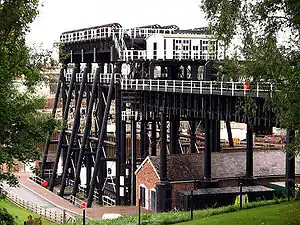Edwin Clark | |
|---|---|
| Born | 7 January 1814 |
| Died | 22 October 1894 (aged 80) Marlow, Buckinghamshire, England |
| Known for | Mathematics master [teacher], Civil Engineer, Hydraulic Engineer, Electrical Engineer, Astronomer |
Edwin Clark FRAS[1] (7 January 1814 – 22 October 1894)[2] was an English Civil Engineer, specialising in hydraulics. He is remembered principally as the designer of the Anderton Boat Lift (1875) near Northwich in Cheshire, which links the navigable stretch of the River Weaver with the Trent and Mersey Canal.[3]
Early life and work
Clark was at one time a mathematical master at Brook Green, then became a Surveyor in the west of England. In 1846 Clark went to London where he met Robert Stephenson, who appointed him Superintending engineer of the Britannia Bridge. Clark, in turn, appointed his brother Josiah Latimer Clark as his Assistant Engineer. When the Britannia Bridge opened on 5 March 1850, Clark published a book The Britannia and Conway Tubular Bridges (3 vols), and by August of that year he had moved on to become an Engineer with the Electric and International Telegraph Company, where he took out the first of several patents for telegraph apparatus; the London and North Western Railway used Clark's telegraph between London and Rugby from 1855.[4]
Stephenson bequeathed him £2000 which he used to build a telescope on top of his house in Honor Oak. He was also known for his astronomy.[5]
Thames Hydraulic Lift Graving Dock
In 1857 Clark became Engineer to the Thames Graving Dock Limited, for which he designed a graving dock in which the ships to be repaired were lifted from the water by hydraulic presses, based on his experience of lifting the tubular sections of Stephenson's Britannia and Conwy tubular bridges over the Menai Strait. In 1866 he delivered a lecture on the subject to the Institution of Civil Engineers, after the lift had been successfully used for about seven years and had raised 1055 ships at a cost of £3 per ship.[6] He was awarded a Telford Medal for the lecture.[7]
Clark's boat lifts


Clark was an experienced Hydraulic Engineer with the firm of Clark, Stansfield & Clark, consulting engineers of Westminster, when he was called upon in 1870 by Edward Leader Williams to design a boat lift to raise boats 50 feet from the River Weaver to the Trent and Mersey Canal.[8] Clark designed the original hydraulic structure opened in 1875, which was later replaced by a wire rope and pulley system from 1908 to 1983 before being returned to hydraulic operation in 2002.[9]
He went on to design other boat lifts in other European countries. In 1879, he presented a project to the Belgian government that included four of his lifts. This project received governmental approval in 1882, but it was 1917 before it was totally operational. When the canal was modernised in the 1960s, the original plan was to demolish the old installations and to redevelop the land. Local objections, and wishes to maintain the installations, were upheld after a long period and in 1988, the whole site of the Canal du Centre became a World Heritage Site. In 2007, the restoration work at all but one of the four Belgian Clark lifts was almost finished.[10]
Legacy
Clark appears in the painting Conference of Engineers at the Menai Straits Preparatory to Floating one of the Tubes of the Britannia Bridge by John Lucas,[2] and is also remembered in the name of the public trip boat that operates on the Anderton Boat Lift.
See also
References
- ↑ "1895MNRAS..55..190. Page 190". Monthly Notices of the Royal Astronomical Society. 55: 190. 1895. Bibcode:1895MNRAS..55..190.. doi:10.1093/mnras/55.4.190. Retrieved 5 February 2017.
- 1 2 National Portrait Gallery. "NPG D10713 Conference of Engineers at the Menai Straits Preparatory to Floating one of the Tubes of the Britannia Bridge".
- ↑ Carden, David (2000). "Chapter 3". The Anderton Boat Lift. Black Dwarf Publications. ISBN 0-9533028-6-5.
- ↑ Jones, Kevin P. "Civil engineers, Architects, etc". SteamIndex. Retrieved 26 March 2009.
- ↑ "Coleson's coppice - Sydenham Town Forum".
- ↑ "The International Canal Monuments List" (PDF). Archived from the original (PDF) on 10 August 2013. Retrieved 13 March 2012.
- ↑ "Annual report Session 1866-67", Minutes of Proceedings of the Institution of Civil Engineers, Institution of Civil Engineers (Great Britain), 26: 121, 1867
- ↑ Jim Shead. "Waterways Engineers and Surveyors – Edwin Clark".
- ↑ British Waterways. "Anderton Boat Lift resource pack" (PDF).
- ↑ Michel Maigre. "Site of the Canal du Centre". Canal-du-centre.be. Archived from the original on 7 November 2008. Retrieved 31 July 2012.